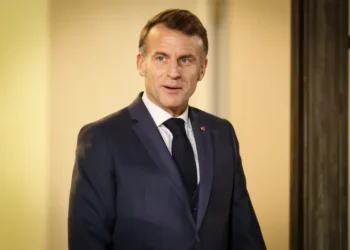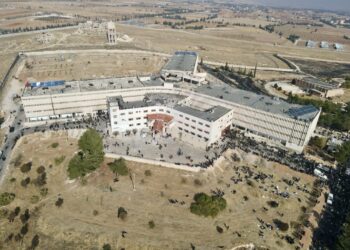Russian forces invaded Ukraine on February 24, 2022, attacking an independent, sovereign state and its democratically elected government. This invasion brought Syrians back to September 30, 2015, when Russian war forces began bombing Syrian territory, lining up alongside their ally, the Syrian regime. I think both interventions are illegal, although there are certainly differences. In Syria, there is an internal armed conflict with a regime that accepts only individual family rule and, in order to stay in power, committed atrocious violations that constitute crimes against humanity. As for the Ukrainian case, we are facing an international armed conflict, in addition to many other differences on the geopolitics, economics, and social levels.
From a human rights standpoint, the protection of civilians and victims should be the norm, regardless of their religion, race, and location. The world’s states and the UN Security Council must take all possible measures to protect civilians from crimes against humanity, war crimes, and genocide, as stipulated in the Geneva Conventions for which states must ensure respect, as well as in many international human rights law treaties. From this aspect, we, as Syrians, have the right to compare the West’s response to the brutal Russian bombing of Ukraine with the West’s response to the brutal Russian bombing, which is even more vicious and violent, of Syria.
Over the years, Russia has committed thousands of human rights violations in Syria, including killings as a result of indiscriminate bombing, targeting vital facilities, including medical centers and Civil Defense centers, destroying entire neighborhoods, and displacing hundreds of thousands of Syrians. Russian violations in Syria have been documented by many UN agencies and international human rights organizations such as Human Rights Watch and Amnesty International, as well as by the Syrian Network for Human Rights (SNHR), whose documentation is distinguished by having the data on the victims who were killed, and by cumulatively recording the record of the centers that were bombed; in its latest annual report, which was issued on September 30, 2021, marking the sixth anniversary of the Russian intervention in Syria, SNHR revealed that Russian forces have killed 6,910 civilians, including 2,030 children and 974 women (adult female), since Russia’s military intervention in Syria on September 30, 2015, up to September 30, 2021, and committed at least 357 massacres. The report also documented Russian forces killing of 70 medical personnel, including 12 women, in addition to killing 44 Civil Defense personnel during the same period. The report also documented the deaths of 24 media workers, all of whom were killed in the governorates of Aleppo and Idlib, and recorded at least 1,231 attacks on vital civilian facilities, including 222 on schools, 207 on medical facilities, and 60 on markets, and at least 237 cluster munition attacks, in addition to at least 125 incendiary weapon attacks, with Russian attacks contributing to the forced displacement of hundreds of thousands of Syrians.
I, as a Syrian, do not wish anyone in the world to suffer from the barbaric Russian or Assadist attacks, with Russia testing various types of weapons with our flesh and blood. We hope that the West will be able to deter Russia in Ukraine, otherwise, Russia will consider this a green light and continue to escalate its level of brutality until reaching that of its own practices in Syria. Therefore, I think that the actions taken by the West in order to deter Russia in Ukraine are excellent steps in the right direction, and they are greatly appreciated, in addition to the fact that they are generally at the heart of international law in order to protect civilians and deter aggression against them.
Having said this, as a Syrian, I cannot help but wonder, why did the West take no such serious steps to punish Russia for its killing and bombing of my country, Syria? Why hasn’t it imposed any sanctions on Russia for its brutal military intervention in Syria? I know that there are answers from the school of foreign policy realism, but, as a human rights defender, I speak from the perspective of the liberal school, and from our approach as victims, not as politicians, and I’m deeply sorry that Syria has been left an open field for Russia, while the latter has paid no tangible price, which is why the vast majority of Russian research centers consider Russia’s military intervention in Syria to be a clear victory and a resounding success for Russian foreign policy. I believe that the West’s inaction in failing to punish Russia and hold it accountable for its brutal crimes in Syria encouraged it to attack Ukraine.
Western support for Ukraine has not been limited to the economic level, including the Swift system and freezing the Russian Central Bank’s overseas assets. Instead, Western support included opening a file at the United Nations General Assembly and demanding that Russia be deterred, as a party to the conflict, from using its veto. Regarding the latter point, I have spoken dozens of times about all the occasions on which Russia used its veto in Syria – 16 in all – but there has been no follow-up or interest. There has also been a demand for invocation of the principle of ‘Uniting for Peace’ in Ukraine, a principle that Syrians have demanded be invoked hundreds of times in Syria. While this article does not provide comparisons for all or even most of the issues in the two cases, I think the examples that have been cited are sufficient to give a good picture of the extent of the double standards involved, while reiterating that we support the steps taken in Ukraine, which are the right of the Ukrainian people.
Syrians hope that the West will return to support our cause, that sanctions will be imposed on Russia for its military intervention in Syria, that the principle of ‘Uniting for Peace’ will be implemented, and that Russia will be prosecuted for the atrocious violations it has committed in Syria, which constitute war crimes and crimes against humanity, through the principle of universal jurisdiction, and in European domestic criminal courts, and that Russia will be deterred from using its veto again regarding Syria, in particular against humanitarian aid delivery.
The West’s success in reining in Russia in Syria means a major step on the way to resolving the Syrian conflict, because this greatly undermines the Syrian regime’s main ally, forcing it to submit to and abide by the terms of negotiations. Moreover, these serious steps towards Russia constitute a kind of accountability for the Russian perpetrators of violations, a good step on the path to accountability.






